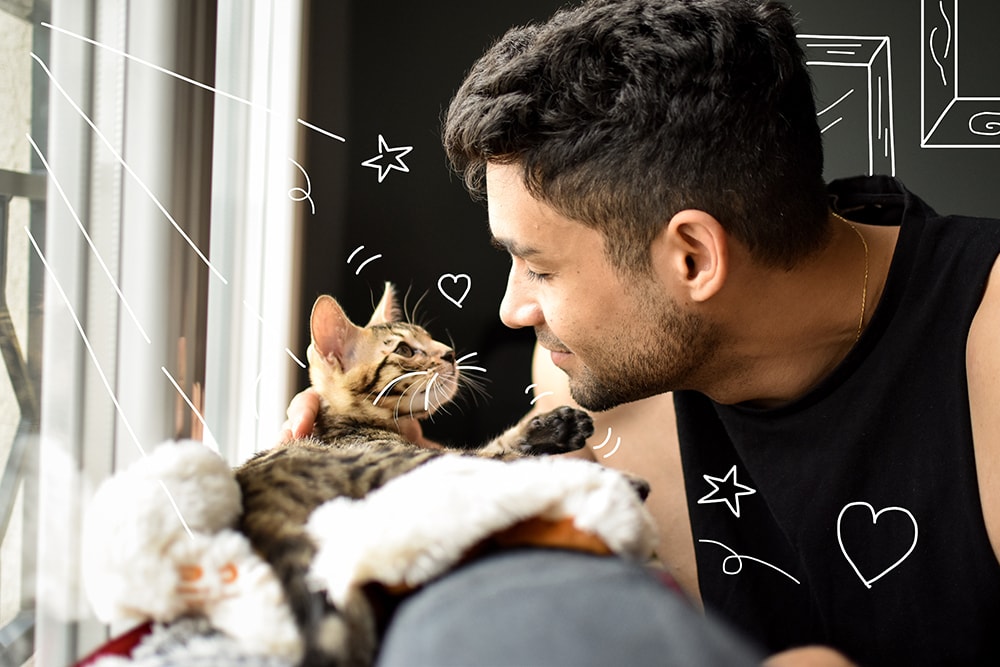Feline Focus: The Bengal Cat – Energetic and Chatty
With heaps of energy and a desire to ‘chat’ to their owners, many find that Bengals are little attention seekers who love to be in the limelight. A fiery, confident and intelligent cat, there’s no denying that the Bengal can be hard work. However, most owners would agree, it is all worth it in the end.
Interestingly, the Bengal is a relatively new breed; not one that has been around since ancient times. The American Domestic Cat was bred with the Asian Leopard Cat to create this beautiful beast. The aim was to create a pet that resembled a wild cat but that was docile and loving.

Their coat is soft and shiny and comes in three accepted colours. This includes silver, brown and snow. Those with snow coloured coats can be seal lynx, seal sepia or seal mink point. To confuse things a little more, we can see both ‘spotted’ and ‘marble’ coats in any colour.
Health Conditions in Bengal Cats
While the Bengal cat typically enjoys good health, there are a small number of medical issues that can be inherited in this breed.
Hypertrophic Cardiomyopathy: This is the most common heart disease we see in our pet cats. As the heart walls thicken, they interfere with the normal pumping action of the heart. The heart cannot pump as effectively which can result in low oxygen levels and cardiac arrythmias. Cats can go on to develop heart failure and/or blood clots. Some affected cats are symptom free while others may experience fast breathing or lethargy. A scan of the heart can diagnose the condition and cats are managed on medication to improve their quality of life. Diagnostic tests and treatment can cost an owner from £600-£4,000, depending on how long their cat lives after diagnosis.
Feline Infectious Peritonitis (FIP): It is generally accepted that the Bengal is more susceptible to FIP than other breeds. FIP is caused by a Coronavirus and signs can include abdominal swelling and laboured breathing. This can be a difficult condition to diagnose as the signs are vague and can occur in several other diseases. Sadly, we cannot cure FIP and nearly all affected cats will ultimately pass away from the disease.
Hip Dysplasia: Though more often associated with dogs, cats can suffer with hip dysplasia too. Affected kitties experience hip pain and hind limb lameness. Owners may notice they hesitate to jump and experience visible muscle wastage. X-rays that are taken under a general anaesthetic can diagnose the condition. While surgery is available for some patients, many cats are managed medically with pain relief and anti-inflammatories. As treatment is life long and cats require ongoing check-ups and blood tests, the cost of managing hip dysplasia can mount to several thousand pounds in a cat’s lifetime.
Flat chested Kitten Syndrome: Affected kittens have a visible deformity and they may struggle to feed and gain weight. Many will improve as they grow and mature. Very severely affected kittens, sadly, may need to be euthansied.
Progressive Retinal Atrophy (PRA): This devastating condition causes progressive loss of vision and eventual blindness in young Bengals. Signs can start from just a few months of age and progress quickly. There is an inherited genetic mutation which can be screened for. This is an important test in breeding Bengals as there is no treatment for PRA.
Is the Bengal the Cat for you?
The Bengal cat makes a wonderful family pet and has a curious and energetic character. While they may still look like a wild cat, they are real pussycats who bond strongly with their owners and enjoy their affection. They do need a good deal of exercise and can become bored easily, so owners need to work hard at keeping them entertained.
Looking for Bengal Cat Insurance?
Cats are full of surprises.
Sadly, life can surprise us with an unexpected financial burden of a veterinary bill if our purrfect pals develop an unexpected illness or have an accident.
Cover your beautiful Bengal throughout all of their adventures with our cat insurance.
Bengal kittens can benefit from four weeks free WallkawayCover kitten insurance. Find your nearest participating veterinary practice today. Kitten must be between eight weeks to one year of age and is subject to a CVS vet health check. WalkawayCover covers illness and accidents instantly.
For adult Bengals, you can get a lifetime cat insurance quote online in a whisker, or call our friendly UK call centre team on 0808 164 8000.
You might also be interested in…
Get a quote in minutes…

Existing customers
Call now on 0808 164 7999
to discuss your policy with us.
Monday - Friday: 08:00 - 20:00 Saturday: 09:00 - 14:00





 Back
Back
